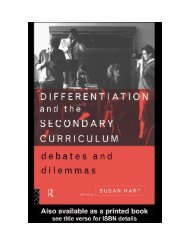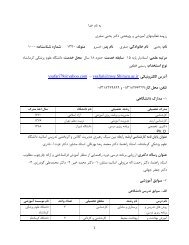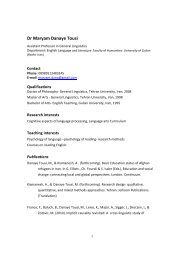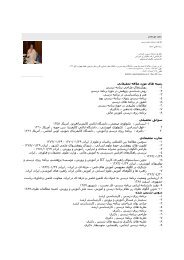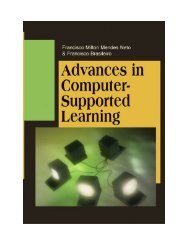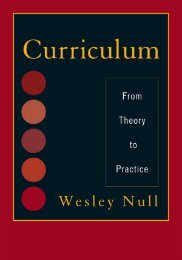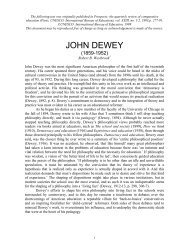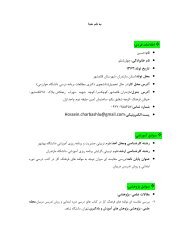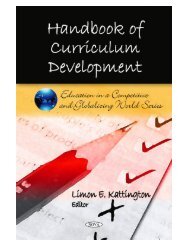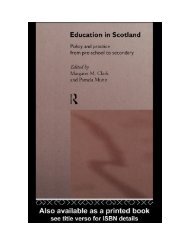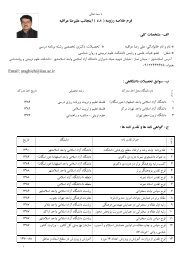The Reconceptualisation of Curriculum Studies
The Reconceptualisation of Curriculum Studies
The Reconceptualisation of Curriculum Studies
You also want an ePaper? Increase the reach of your titles
YUMPU automatically turns print PDFs into web optimized ePapers that Google loves.
208 JOURNAL OF CURRICULUM STUDIES 10:3<br />
Downloaded by [University <strong>of</strong> Gothenburg] at 05:06 14 September 2011<br />
implemented without requisite funds?<br />
With the traditional, practical justification <strong>of</strong> the field attenuated—even<br />
teacher-training efforts have slowed dramatically—new justifications appeared.<br />
<strong>Curriculum</strong> and other education subfields have become increasingly vulnerable<br />
to criticisms regarding scholarly standards by colleagues in so-called cognate<br />
fields. Particularly the influence <strong>of</strong> colleagues in the social sciences is evident,<br />
parallelling the political ascendency <strong>of</strong> these disciplines in the university generally.<br />
In fact, research in education, in many instances, has become indistinguishable<br />
from social science research. <strong>The</strong> appearance and proliferation <strong>of</strong> conceptualempiricists<br />
in the curriculum field is a specific instance <strong>of</strong> this general phenomenon.<br />
<strong>The</strong>re remains, <strong>of</strong> course, the notion that research has implications for<br />
classroom practice, but it is usually claimed that many years <strong>of</strong> extensive research<br />
are necessary before significant implications can be obtained.<br />
This development has gone so far that, examining the work done by a<br />
faculty in a typical American college <strong>of</strong> education, one has little sense <strong>of</strong> education<br />
as a field with its own identity. One discovers researchers whose primary identity<br />
is with the cognate field. Such individuals view themselves as primarily psychologists,<br />
philosophers, or sociologists with ' research interests ' in schools and<br />
education-related matters. By 1978, it is accurate to note that the education<br />
field has lost whatever (and it was never complete <strong>of</strong> course) intellectual autonomy<br />
it possessed in earlier years, and now is nearly tantamount to a colony <strong>of</strong> superior,<br />
imperialistic powers.<br />
<strong>The</strong> view that education is not a discipline in itself but an area to be studied<br />
by the disciplines is evident in the work <strong>of</strong> those <strong>of</strong> curricularists I have called<br />
conceptual-empiricists. <strong>The</strong> work <strong>of</strong> this group can be so characterized, employing<br />
conceptual and empirical in the sense social scientists typically employ<br />
them. This work is concerned with developing hypotheses to be tested, and<br />
testing them in methodological ways characteristic <strong>of</strong> mainstream social science.<br />
This work is reported, ordinarily, at meetings <strong>of</strong> the American Educational<br />
Research Association. Just as the Association for Supervision and <strong>Curriculum</strong><br />
Development is the traditionalists' organization, AERA tends to be the organization<br />
<strong>of</strong> conceptual-empiricists. (In relatively small numbers traditionalists<br />
and reconceptualists also read papers at AERA annual meetings.)<br />
An illustrative piece <strong>of</strong> conceptual work from this second group <strong>of</strong> curricularists<br />
was published in the AERA-sponsored Review <strong>of</strong> Educational Research.<br />
It is George Posner's (with Kenneth Strike) 'A categorization scheme for<br />
principles <strong>of</strong> sequencing content'. A prefatory paragraph indicates that his view<br />
is a social scientist's one, reliant upon hypothesis-making, data collection, and<br />
interpretation.<br />
We have very little information, based on hard data, regarding the<br />
consequences <strong>of</strong> alternative content sequences and will need a good<br />
deal more research effort before we are able to satisfactorily suggest<br />
how content should be sequenced. Our intention here is to consider<br />
the question, What are the alternatives? 7<br />
<strong>The</strong> article is a conceptual one, concerned with what the authors view as logically<br />
defensible content sequencing alternatives, and it is empirical in its allegiance<br />
to the view <strong>of</strong> empirical research, one yielding 'hard data', typical <strong>of</strong> social<br />
science at the present time.



